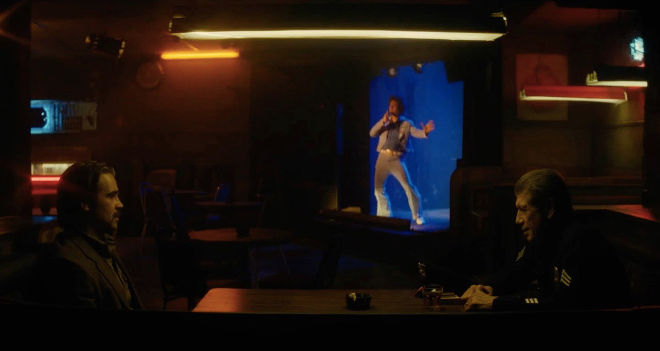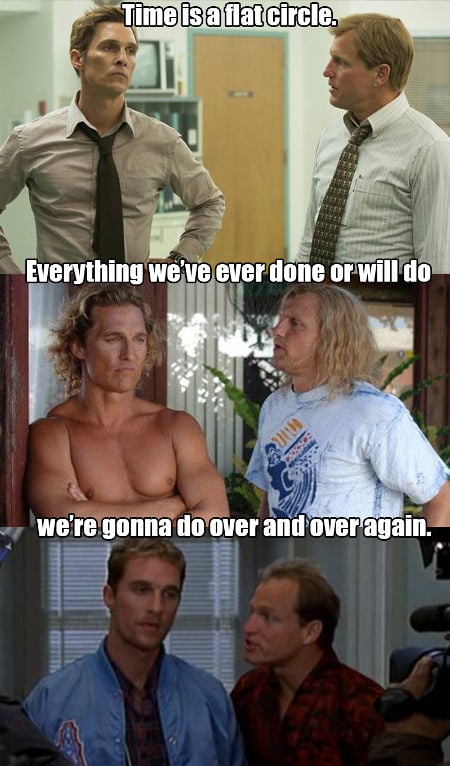The Critical Derision Of ‘True Detective’ Season Two Proves We’re Getting Sick Of TV’s Sad White Man
Shows like 'Orange Is The New Black', 'Transparent', 'UnREAL' and even 'The Fall' are getting more critical nods these days. Is our definition of 'good TV' finally changing?

When it was announced last year that True Detective’s second season would again feature two very white men as its protagonists, many were pissed. Not because there’s anything inherently wrong with two good-ol’-boys running around town solving mysteries, but because I can’t believe this is happening again.
After a bleak first season full of bourbon-guzzling southern cops in various states of disintegration, the second series could have been an opportunity to do something radical with its form. Instead, we have Colin Farrell and Vince Vaughn struggling to reclaim their thwarted positions of dominance in the midst of a murder case with occult overtones. Cool, man. Nice.
just reading about True Detective casting and Vince Vaughn so happy someone has finally given a break to a mid-40s white guy.
— Rebecca Shaw (@Brocklesnitch) September 25, 2014
It was a disappointing choice, though not totally surprising. For a long time, ‘prestige’ television has been a very white, very masculine space, dominated by stories that probe the psyches of conflicted patriarchs and macho psychopaths. Critically beloved and massively successful dramas like Breaking Bad, The Sopranos, Mad Men, and Boardwalk Empire have all delivered expansive narratives with a white man’s consciousness at their centre. The white dude drama is so prevalent that it’s often considered the default mode of ‘good’ TV, the only form to have serious ambitions. Similarly, shows like True Detective are often treated with such reverence because they outright ask to be: they cloak their gunfights and boozy sex scenes in signifiers of Great American Art – the lyrical vastness of the country, and the brooding man struggling to find his place within it – in an effort to announce themselves as meaningful.
But much of the time they tell a very similar story, and viewers are tiring of it.
Brooding Men; Paper-Thin Women
True Detective’s first season was widely hailed as a masterpiece. It had all the stuff your English lecturer told you was necessary for art to be any good: brooding existentialism, literary ambition, and an investigation into fragile masculinity. It had a lurid, auteurish cinematic style, and the kind of oblique dialogue that wouldn’t be out of place in a Don DeLillo novel. But even then, a small minority were detecting issues with the show that would come to cripple it in its second season.
In a reservedly critical piece, Emily Nussbaum, TV critic for The New Yorker, pulled the show up on its inability to imagine anything outside of a white dude’s frame of reference: “While the male detectives of True Detective are avenging women and children and bro-bonding over “crazy pussy,” every live woman they meet is paper-thin”. And though it’s true that the first season was very much a show about the damage men can do, to not make an effort to portray the effects of that damage on others seemed like a huge oversight.
This season, that criticism has escalated dramatically. For Vox, Todd VanDerWerff points out that “Abigail Spencer … does her best to turn [her] character into anything other than a hectoring scold, but her efforts aren’t enough to salvage her one scene,” and that “Kelly Reilly is basically just around to be a sounding board for Frank”. And though Rachel McAdams’s character Ani Bezzerides has emerged as a female lead, it is often suggested that her clichéd character type (the hardened female cop who has had to “man up” just to get along in her job) doesn’t redeem showrunner Nic Pizzolato from charges of being unable to write substantial female characters so much as reinforce them. Writing for Screencrush, Kevin Fitzpatrick notes that Bezzerides’s character is “occasionally handled with all the grace you’d expect from a mind crafting comparisons of Bezzerides’ e-cigarette to ‘sucking a robot’s dick’”; writing for The A.V. Club, Brendan Nowalk declares that “none of these characters have ever found anything funny in their lives”.
Virtually the only thing that has been admired across the board about the second season is its “Lynchian overtones”, which more or less amount to the dream sequence at the start of episode three that was lifted straight from the Blue Velvet playbook.

It doesn’t stop with the critics, either. More than any show of its kind, viewers love to take the piss out of True Detective. That one of the first season’s biggest claims to high art seriousness – the “Time Is A Flat Circle” monologue – has become a meme is indicative of an ongoing shift in consensus on what makes worthwhile TV.

Of course, making memes out of a show isn’t always a critical gesture. But where the Tumblr-fication of shows like Hannibal suggest a fondness for its characters and baroque aesthetic, in the case of True Detective it feels like an attack on its intensely serious, macho foundations. On Twitter in particular, True Detective is less a talking point than a punching bag, with any even slightly amusing image including two people suffering from the hashtag #TrueDetectiveSeason2.
A boner is the life cycle as urge. Crawling, upright, then inexorably collapsing. Innocence, tumescence, senescence. pic.twitter.com/asrrUfanLQ
— Big Sexy Jeb! Lund (@Mobute) June 16, 2015
–
Where To From Here?
It’s clear that this model of the prestige drama is becoming eclipsed by a more diverse approach to storytelling. With shows like Orange Is The New Black and Transparent breaking through, it’s no surprise that True Detective’s brand of Cormac McCarthy-lite crime is fast becoming a laughable relic. OITNB, for instance, is deeply committed to examining human difference. Many have criticised the show’s use of a painfully bourgeois white woman as an “accessible” entrance point into the stories of people of colour, but the space it gives to the life-narratives of marginalised people without fetishising them is laudable. In the same way that Comedy Central’s Broad City and Inside Amy Schumer bring female voices to the fore, OITNB tells stories that examine tensions and anxieties that often go ignored. In doing so, it becomes not only a socially important show, but a show that actually is radical, instead of just making grand philosophical statements and hoping it will be interpreted that way.
Even The Fall, a BBC crime series set in Belfast, is able to use traditional crime tropes (serial killer; murdered women; renegade detectives) in order to create something novel and unexpected. Where True Detective falls into the trap of using the gruesome deaths of women in order to yet again say something about men, The Fall is unafraid to call its serial killer what he is: a misogynist and a coward. Stella Gibson (Gillian Anderson), the show’s protagonist, is an enigmatic detective who consciously uses psychic doubling as a way of dealing with the shittiness of the world; she is able to effortlessly separate the emotional from the physical. Like the killer, she can reduce the person in front of her to nothing more than a pile of flesh and bone. But rather than use this skill to enforce patriarchal violence, she uses it to resist it, and to prevent it. As a TV drama, The Fall is equally as atmospheric and violent as True Detective, but it offers the added bonus of having something coherent to say about the world.
With so many series treading into new territory (see also: UnREAL, Sense8, Orphan Black), for a show with the visibility and budget of True Detective’s to simply recycle noir tropes that became clichés fifty years ago just isn’t going to fly anymore. Grim cinematography and philosophical digressions don’t make meaningful art in and of themselves.
For all its problems, True Detective‘s sheer ambition and appetite for intense, sprawling storytelling gives it the opportunity to do something truly unique with the cable drama formula. At this point, its innovations have been mostly visual: on an aesthetic, cinematic level, there is very little on TV that looks like it. But style can only take a show so far; it will be interesting to see whether Pizzolato is able or willing to pull a potential third season out of its gloomy, manly rut.
–
True Detective‘s second season airs on Foxtel’s Showcase every Monday at 3.30pm (express from the US), before being re-broadcast at 7.30pm. Read our recaps here.
–
Sean Watson is a writer from Melbourne and a former editor of Farrago. He tweets garbage at @shawnwortson and can be found on Tumblr.

